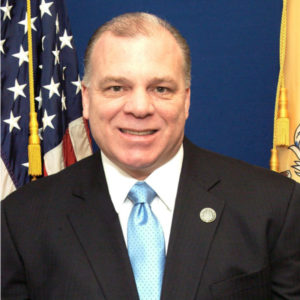 View the entire newsletter for more articles: 2018 – NJAC County Biz – November
View the entire newsletter for more articles: 2018 – NJAC County Biz – November
by Steve Sweeney, President of the New Jersey Senate
New Jersey faces a daunting fiscal crisis.
For two decades, while you and your predecessors made the proper pension payments, New Jersey governors from both parties underfunded the pension system for teachers and state government workers.
As a result, the State’s unfunded liability for pensions and retiree health benefits now tops $150 billion — four times the size of the state budget and over $16,000 per resident.
Because pensions are a contractual right and state governments – as sovereign entities with the power to tax – cannot go bankrupt, we have no choice but to make the payments. It will not be easy: Over the next four years we have to increase pension funding from $3.2 billion in this year’s budget to $6.7 billion to finally reach our “Actuarially Required Contribution.”
That $3.5 billion increase in pension payments, coupled with a $700 million increase in the cost of health benefits for employees and retirees, over the next four years is nearly double our projected annual revenue growth.
If we don’t get these costs under control they will crowd out crucial needs like fixing NJ Transit, making higher education more affordable, addressing our antiquated 9-1-1 system and fully funding school aid at the same time they will require big tax increases.
We do not have a revenue problem. We have a spending problem. We cannot tax our way out of this crisis. Our taxpayers already bear a high tax burden and we owe it to them to spend their dollars more efficiently.
Responsible leaders manage risk. That’s why I convened the non-partisan Economic and Fiscal Policy Workgroup of top economists, accountants, and public finance experts to recommend solutions to address our fiscal crisis and to make New Jersey more competitive and affordable.
In August, the workgroup issued 30 common-sense recommendations to address the fiscal crisis. They take a measured approach that will provide savings for the state budget, for county and municipal budgets, for school districts and for employees and taxpayers.
The group recommends the creation of a hybrid pension system that preserves the current defined benefit pension system for teachers and state, county and municipal workers in the Teachers Pension and Annuity Fund and Public Employees’ Retirement System with at least five years of service.
It puts new hires and non-vested employees with less than five years into a hybrid plan that provides the same pension that other employees receive on their first $40,000 of income and adds a cash balance account that provides a guaranteed four percent return or 75 percent of pension fund earnings on income above that.
It recognizes that people work and live longer by raising the age for retirement for those with less than five years of service to receive full benefits from age 65 to match the Social Security age, which is scheduled to go up to 67.
The group recommends that we aggressively explore opportunities for both the state and local governments to dedicate assets and their revenue streams to the pension system, as we did previously with the State Lottery.
To control healthcare costs, the committee recommends shifting all employees and retirees from the current Platinum-level plan to a Gold plan, which is comparable to coverage offered by other public employers and the best private sector companies. This would immediately save $585 million for the state and at least $600 million more for local governments, and over $100 million for their employees.
Some of the biggest savings for local governments would come from a proposal to cap payments for future unused sick leave, which will eventually put an end to the “boat checks” that are so costly for property taxpayers.
Contrary to some early reports, the committee did not recommend consolidation of small municipalities because an analysis showed that it would not result in significant cost savings. However, the panel did identify best practices for sharing services, such as county-level tax assessment, code enforcement, health services and emergency dispatch. In many cases, our counties are ahead of the curve. We need to bring more municipalities on board.
Two of the most important recommendations are the consolidation of small school districts into regional K-12 districts to ensure a coordinated curriculum and a state takeover of Extraordinary Special Education funding and services. Both recommendations are designed primarily to provide better educational services and, secondarily, to achieve property tax savings.
In the months ahead we will refine the workgroup’s recommendations based on discussions with local governments, constituents and other stakeholders. We have already met with mayors and freeholders in several counties, and more countywide meetings are scheduled. We look forward to hearing your ideas.
We cannot afford to wait any longer because a fiscal crisis is now on our doorstep. It is time to restore fiscal sanity and make New Jersey more affordable for all of our citizens.
Senator Steve Sweeney (D-Gloucester/Salem/Cumberland) is President of the New Jersey Senate. The full task force report can be found at pathtoprogressnj.org.
